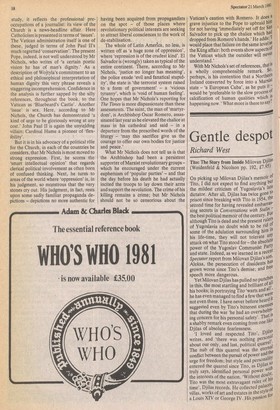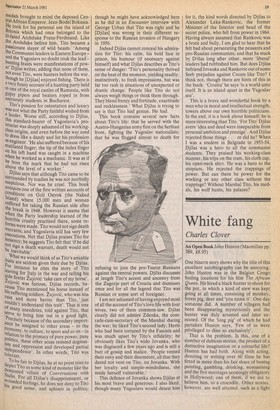Gentle despot
Richard West
Tito: The Story from Inside Milovan Djiles (Weidenfeld & Nicolson pp. 192, £7.95) On picking up Milovan Djilas's memoir of Tito, I did not expect to find anything but the mildest criticism of Yugoslavia's late dictator. After all, Djilas has twice gone t° prison since breaking with Tito in 1954, the second time for having revealed embarros' sing secrets in Conversations with Stalin the best political memoir of the century. For although Tito is dead and the present rulers, of Yugoslavia no doubt wish to be rid 0.1 some of the adulation surrounding him In his life-time, they will not tolerate allY attack on what Tito stood for the absolute power of the Yugoslav Communist PartY and state. Indeed, as we learned in a recent Spectator report from Milovan Djilas's sons Aleksa, the persecution of dissidents has grown worse since Tito's demise; and free speech more dangerous. Yet Milovan Djilas has pulled no punche,s, in this, the most startling and brilliant of a," his books; in portraying Tito 'warts and all he has even managed to find a few that Were not even there. I have never before heard it suggested even by Tito's bitterest enemies that during the war 'he had an overwheln1" ing concern for his personal safety'. That is a shabby remark even coming from one like Djilas of absolute fearlessness. 'I loved and respected Tito', Dillas, writes, and 'there was nothing persona,' about our only, and last, political quarrel' The nub of this quarrel was the eternal conflict between the pursuit of power and the urge for freedom; but style and personalltY entered the quarrel since Tito, as Djilas s0,. truly says, identified personal power with the interests of the nation. 'Without doh!' Tito was the most extravagant ruler of his time', Djilas records. He collected palaces villas, works of art and estates in the style ° a Louis XIV or George IV. His passion for medals brought to mind the deposed Central African Emperor, Jean-Bodel Bokassa. He took for his personal use the island of Brionia which had once belonged to the 111-fated Archduke Franz-Ferdinand. Like the Archduke before him, Tito became a Passionate slayer of wild beasts. 'Among the Communist leaders in Eastern Europe — and the Yugoslays no doubt took the lead — hunting feasts were manifestations of power' Djilas writes; adding that none of them, not even Tito, were hunters before the war, though he [Djilas] enjoyed fishing. There is a very funny account of a hunting party held In one of the royal castles of Rumania, with gYPsY pipers and beaters roped in from university students in Bucharest. Tito's passion for ostentation and luxury Was not what the Party faithful wished from a leader. Worse still, according to Djilas, this standard-bearer of Yugoslavia's proletariat was deeply ashamed of his workingclass origins, and even before the war used to dress like a dandy and list his profession as engineer. `He also suffered because of his Mutilated finger; the tip of the index finger On his left hand was caught in a machine When he worked as a mechanic. It was as if he bore the mark that he had not risen above the level of a worker.' Djilas says that although Tito came to be surrounded by toadies he was not morbidly suspicious. Nor was he cruel. This book contains one of the first written accounts of conditions on Goli Ostrok (the Naked Island) where 15,000 men and women suffered for taking the Russian side after the break in 1948. However it seems that When the Party leadership learned of the horrible cruelty practised there, some reforms were made. Tito would not sign death warrants; and Yugoslavia still has very few executions. Not that Djilas praises Tito for leniency; he suggests Tito felt that If he did not ,sign a death warrant, death would not be Inevitable'. What we would think of as Tito's amiable traits are seldom given their due by Djilas. Por instance he cites the story of Tito le.aving for Italy in the war and telling his Tcle Sreter ±ujovi 'take care of my horse'. 4ufnvid was furious, Djilas records, because Tito mentioned his horse instead of hIS suffering soldiers. Zujovid, who was less vain and more heroic than Tito, just couldn't understand this trait'. That is one of many anecdotes, told against Tito, that serve to bring him out in a good light. Precisely because of the secondary importance he assigned to other areas — to the economy, to culture, to sport and so on — in relation to the primacy of pure power, pure Politics, these other areas resisted dogmatism and oppression and developed partial independence'. In other words, Tito was tolerant. To be fair to Djilas, he at no point tries to depict Tito as some kind of monster like the d_emented villain of Conversations with Stalin. For all Djilas's disappointment, or %younded feelings, he does not deny to Tito nIs good sense, and aplomb in politics; though he might have acknowledged here as he did in an Encounter interview with George Urban that Tito was right and he [Djilas] was wrong in their different response to the Russian invasion of Hungary in 1956. Indeed Djilas cannot conceal his admiration for Tito: his calm, his bold face in prison, his humour (if necessary against himself) and what Djilas describes as Tito's sense of danger: 'Tito's personality thrived on the heat of the moment, yielding readily, instinctively, to fresh impressions, but was far too rash in situations of unexpected or drastic change. People like Tito do not always weigh things or think them through. They blend frenzy and fortitude, exactitude and recklessness.' What Djilas is trying to say is that Tito had genius. He had. This book contains several new facts about, Tito's life: that he served with the Austro-Hungarian army first on the Serbian front, fighting the Yugoslav nationalists; that he was flogged almost to death for refusing to join the pro-Tsarist Russians against the central powers. Djilas discusses at length Tito's accent and ancestry from the Zagorje part of Croatia and dismisses once and for all the legend that Tito was Russian or some sort of foreigner.
I am not ashamed of having enjoyed most of all the account of Tito's love life with four wives, two of them common-law. Djilas clearly did not admire Zdenka, the comrade-aim-secretary of the Marshal during the war; he liked Tito's second lady, Herta who had been tortured by the Fascists and was much upset by Tito's infidelity; he obviously likes Tito's wido Jovanka, who was disgraced a few years ago and is still a butt of gossip and malice. 'People vented their envy and their discontent, all that they dared not vent on Tito, on Jovanka. With her loyalty and simple-mindedness, she made herself vulnerable.' This defence of Jovanka shows Djilas at his most brave and generous. I also liked, though many Yugoslays would detest him for it, the kind words directed by Djilas to Alexander Leka-Rankovic, the former Minister of the Interior and head of the secret police, who fell from power in 1964, Having always assumed that Rankovic was a brute and bully, I am glad to hear that he felt bad about persecuting the peasants and pro-Russian communists; and that he stuck by Diilas long after other, more 'liberal' leaders had rubbished him. But does Djilas befriend Jovanka and Rankovic out of some Serb prejudice against Croats like Tito? I think not, though there are hints of this in the book. 'Croatia' he says 'is a world unto itself. It is an island apart in the Yugoslav sea'. This is a brave and wonderful book by a man who in moral and intellectual strength, towers above our own horrible politicians. In the end, it is a book about himself; he is more interesting than Tito. 'For Tito' Djilas avers 'idea and deed were inseparable from personal ambition and prestige'. And Djilas rejected those things . . or did he? When I was a student in Belgrade in 1953-54, Djilas was a hero to all the communist students. They praised his working-class manner, his trips on the tram, his cloth cap, his open-neck shirt. He was a hero to the utopians. He rejected the trappings of power. But can there be power for the working or any other class without the trappings? Without Marshal Tito, his medals, his wolf hunts, his palaces?







































 Previous page
Previous page